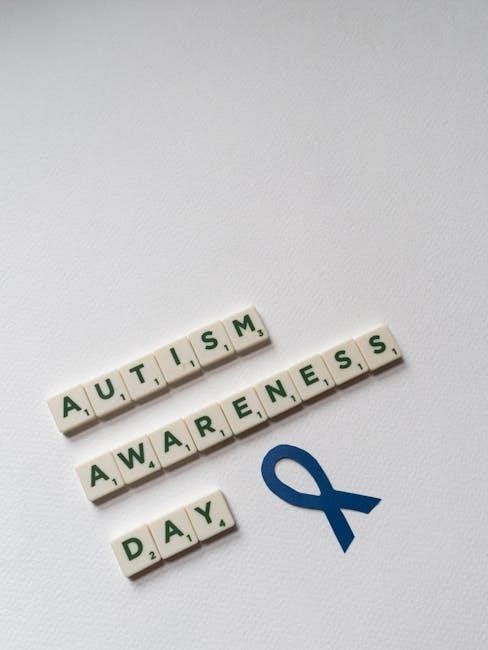Oppositional Defiant Disorder (ODD) is a neurodevelopmental condition marked by persistent patterns of defiance, anger, and disobedience, typically emerging in childhood or adolescence.
1.1 Definition and Symptoms of ODD
Oppositional Defiant Disorder (ODD) is a neurodevelopmental condition characterized by persistent defiance, anger, and disobedience. Common symptoms include deliberate annoyance of others, blaming others for mistakes, frequent temper outbursts, and refusal to comply with rules or authority. These behaviors are often disruptive and interfere with daily interactions. Children and teens with ODD may exhibit uncooperative attitudes, hostile actions, and a tendency to deliberately provoke others. Early recognition of these symptoms is crucial for effective intervention and support.
1.2 Importance of Worksheets in Managing ODD
Worksheets are a valuable tool in managing Oppositional Defiant Disorder (ODD) as they provide a structured framework for identifying triggers, exploring emotions, and developing coping strategies. They offer practical exercises that help individuals recognize and challenge negative thoughts and behaviors, fostering positive change. Worksheets are particularly useful for children and teens with ODD, as they provide clear guidance and activities tailored to their needs, promoting self-awareness and personal growth. They are often used by parents and therapists to support therapy sessions and daily behavior management.

Benefits of Using Worksheets for ODD
Worksheets provide a structured approach to managing ODD, offering tools for emotional regulation, communication, and identifying triggers. They help individuals develop coping strategies and improve behavior patterns.
2.1 Structured Framework for Behavior Management
Worksheets offer a systematic approach to managing ODD behaviors, helping individuals recognize triggers and develop healthier responses. They provide clear guidelines for identifying negative patterns, challenging unhelpful thoughts, and practicing positive alternatives. Through structured exercises, individuals can track progress, fostering accountability and consistency in behavior management. This framework supports both children and adolescents, aiding in the development of self-regulation skills and encouraging constructive interactions with others.
2.2 Cognitive-Behavioral Techniques in Worksheets
Cognitive-behavioral techniques in worksheets help individuals with ODD identify and challenge negative thought patterns, replacing them with constructive alternatives. These exercises guide users to recognize triggers, explore consequences of their actions, and develop problem-solving skills. By fostering awareness of emotions and behaviors, worksheets empower individuals to manage defiance and improve interpersonal interactions, promoting positive behavior changes and emotional regulation.

Types of Worksheets Available
Worksheets for ODD include cognitive-behavioral, emotional regulation, anger management, and family collaboration exercises, each designed to address specific aspects of defiant behaviors and skill development.
3.1 Cognitive-Behavioral Worksheets
Cognitive-behavioral worksheets are designed to help individuals with ODD identify and challenge negative thought patterns that lead to defiant behaviors. Based on CBT principles, these tools guide users to recognize triggers, analyze their thoughts, and develop more constructive responses. By restructuring harmful beliefs, individuals can improve emotional regulation and behavior management. These worksheets often include exercises to explore the consequences of actions and practice problem-solving skills, fostering a more positive and adaptive mindset. They are particularly effective when used collaboratively with parents or therapists to reinforce learning and progress.
3.2 Emotional Regulation and Communication Skills Worksheets
Emotional regulation and communication skills worksheets are essential tools for managing ODD. These resources help individuals identify and express emotions effectively, reducing defiance. Activities include recognizing emotional triggers, practicing active listening, and role-playing positive interactions. By enhancing self-awareness and social skills, these worksheets foster healthier relationships and emotional stability. They often incorporate visual aids and structured exercises to make learning engaging and accessible, especially for children and teens struggling with communication challenges. Regular practice with these tools can lead to significant improvements in interpersonal interactions and overall emotional well-being.
3.3 Anger Management and Triggers Identification Worksheets
Anger management and triggers identification worksheets are designed to help individuals with ODD recognize and manage anger-provoking situations. These tools guide users in identifying specific triggers, exploring the consequences of their reactions, and developing healthier coping strategies. By understanding the root causes of anger, individuals can learn to respond more appropriately, reducing defiant behavior. These worksheets often include exercises for self-reflection, problem-solving, and emotional awareness, fostering improved emotional regulation and stability in daily interactions.
3.4 Collaborative Strategies and Family Involvement Worksheets
Collaborative strategies and family involvement worksheets are essential for addressing ODD, fostering teamwork between the child and their support system. These tools help create structured plans for behavior management, involving parents and caregivers in the therapeutic process. Activities include setting shared goals, practicing positive communication, and engaging in problem-solving exercises. By encouraging active participation, these worksheets strengthen family bonds and promote a supportive environment, enhancing cooperation and reducing defiance in daily interactions.

Effective Strategies and Activities
Effective strategies for managing ODD include structured programs, positive reinforcement, and interactive activities. These approaches encourage teamwork and improve communication, fostering a supportive environment for children.
4.1 Fun Activities for Kids with ODD
Fun activities for kids with ODD include arts, crafts, and outdoor games that promote emotional regulation and teamwork. Mindfulness exercises and role-playing help improve communication skills and reduce defiance. Structured games like puzzles and board games encourage problem-solving and self-control. These engaging activities create a positive environment, helping children manage their emotions while building confidence and cooperation. Incorporating CBT-based worksheets ensures a therapeutic approach, making learning enjoyable and effective for children with ODD.
4.2 Practical Tools for Parents and Therapists
Parents and therapists can utilize worksheets, behavior charts, and CBT exercises to manage ODD effectively. These tools provide structured frameworks for identifying triggers and teaching adaptive behaviors. Printable PDF resources, such as emotional regulation and communication skill worksheets, offer actionable strategies. Collaborative activities involving family members foster a supportive environment, while step-by-step guides ensure consistency in therapy. These practical tools empower caregivers and professionals to help children overcome defiance and develop positive coping mechanisms, promoting long-term behavioral improvement and emotional well-being.

Downloadable Resources
Downloadable resources, such as free printable PDF worksheets, are widely available for managing ODD. Websites like Happier Therapy and Child Therapy Guide offer CBT-based tools, emotional regulation exercises, and activities tailored for kids and teens. These resources provide structured frameworks for parents and therapists to address defiance, improve communication, and foster positive behavior. Printable materials ensure accessibility and convenience, making it easier to implement effective strategies for children with ODD.
5.1 Free Printable Worksheets
Free printable worksheets for ODD are widely accessible online, offering practical tools for managing defiance and improving behavior. Websites like Happier Therapy and Child Therapy Guide provide CBT-based exercises, emotional regulation activities, and communication skill-builders. These worksheets are designed for kids and teens, helping them identify triggers, challenge negative thoughts, and develop positive behaviors. Parents and therapists can easily download and print these resources, making them a convenient and effective solution for addressing ODD symptoms and fostering personal growth in children.
5.2 Websites Offering ODD-Related Materials
Websites like Teachers Pay Teachers and Happier Therapy offer a wide range of ODD-related materials, including downloadable PDF worksheets and guides. These platforms provide accessible tools for managing defiance, emotional regulation, and behavior modification. Many resources are designed for both parents and therapists, offering structured exercises and activities to help children with ODD. These websites are trusted sources for practical and engaging materials that support positive behavioral changes and personal growth in kids and teens.

Implementation and Usage
Begin by locating a quiet, distraction-free space to focus. Reflect on past situations triggering rebellious behavior, then challenge negative beliefs and replace them with positive, evidence-based alternatives.
6.1 Step-by-Step Guide to Using Worksheets
Start by identifying triggers and recording them in the worksheet. Reflect on past situations that led to rebellious behavior.
Challenge negative beliefs by questioning their validity and replacing them with positive, evidence-based thoughts.
Use the structured framework to explore emotions and actions, gaining insight into rebellious conduct.
Collaborate with family or therapists to brainstorm strategies for managing oppositional tendencies.
Regularly review progress and adjust approaches as needed to foster adaptive thinking and behavior.
6.2 Creating a Conducive Environment for Therapy
Establish a calm, distraction-free space for therapy sessions to help individuals focus. Use structured frameworks from worksheets to guide discussions and activities. Encourage open communication and active listening to build trust. Incorporate positive reinforcement to motivate progress. Involve family members or caregivers to foster a supportive environment. Provide opportunities for quiet breaks and activities that promote emotional regulation, such as coloring or fine motor skills exercises. Ensure the space is comfortable and free from triggers to facilitate effective therapy.

Worksheets for ODD provide a structured, effective approach to managing symptoms, empowering individuals and families to foster positive behavior and lasting change through guided activities.
7.1 Impact of Worksheets on Managing ODD
Worksheets for ODD have a profound impact by providing structured tools that help individuals identify triggers, challenge negative thoughts, and develop adaptive behaviors. They foster emotional regulation and improve communication skills, enabling children to manage defiance and anger more effectively. These resources also involve parents and therapists, creating a collaborative environment for consistent support. By promoting self-reflection and positive change, worksheets play a crucial role in long-term behavior management and personal growth for those with ODD.
